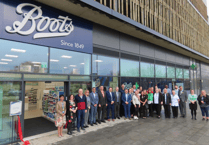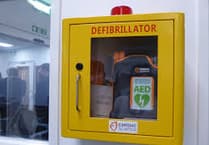Keeping up with emergency services, meeting new people and doing something different every day – such is the life of a newspaper reporter.
We can sometimes go out on jobs several times a week, interviewing interesting people with unique stories. The rest of the week is spent writing up stories, following up leads, talking to press officers, hunting down new things to write about and replying to emails.
But when you get out of the office, you get to do some pretty cool stuff that other people don’t get to do.
In the five years I have been a reporter with South Hams Newspapers, I have had the privilege of a ride along with Devon and Cornwall Police; been through a day’s training with Devon and Somerset Fire and Rescue Service; watched local amateur dramatic performances; been out on a coastal tour with Sea’N’Shore; taken part in a training session with the Salcombe RNLI lifeboat; taken part in a ‘try dive’ with Totnes British Sub Aqua Club; and fired a few arrows with the archers of Totnes.
One of the best things about being a local reporter is not knowing what is going to happen from one day to the next. You could be called out to a fire or to take photos of the air ambulance landing, or, like I did once, go on the hunt for an escaped emu!
You also get to know local groups and organisations, the schools, the local councils, the emergency services, the Rotary clubs, the charities and local campaigners.
You can also meet some of the most interesting people. Meeting 104-year-old Elsie Duffy will forever be one of my highlights, not just of the job, but of my life. I spent hours chatting to her about her life and how she had come to be in the South Hams.
My colleague Kristen Bounds thinks the same of meeting 92-year-old Ivor, who had dedicated many years of his life to gaining recognition for the pilots and gunners of RAF Bomber Command.
Another interesting part of the job is attending court. We often attend magistrates court, crown court for more serious hearings and coroner’s court for inquests.
While occasionally this isn’t the most pleasant thing to do, I remember being in court for the case against Alex Peguero Sosa’s murderer, and for the drink-driver who was found guilty of killing little three-year-old Reuben Williams in a car crash.
While neither of these was something anyone wants to hear about, it is a privilege to cover those stories, to inform people of the workings of the justice system. No one wants to live in a country with secret courts.
Local journalism is also very important for local democracy. Print media, both local and national, is struggling, against factually unreliable social media and the internet. But it’s the staff of local newspapers who hold local councils to account.
We attend local town and parish councils, those organisations who spend our tax money on our local area. Without the local newspaper, few would be following what they are doing and reporting what they are up to.
The newspaper is also where people find out about what is going on in the area, about planning applications, post offices and banks closing, about local campaigns and problems.
There have been times when we have taken up stories and helped people get their problems sorted. It’s surprising how companies and corporations listen when contacted by a journalist.
Working as a reporter also gives you some great transferable skills, and gives you the confidence to talk to anyone, from any walk of life.
You become great at working out who it is you need to speak to to deal with a specific problem and having the courage to do just that.
>> Do you fancy the life of a reporter and you think you have got what it takes? We are currently recruiting.
Email your CV to [email protected]. Loads of enthusiasm and own car essential.




